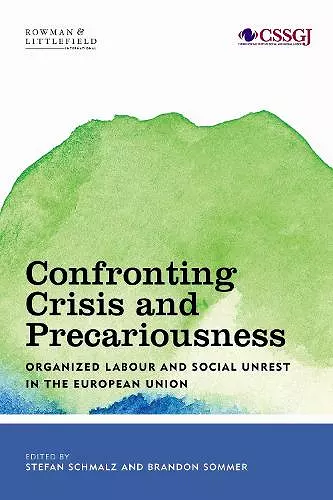Confronting Crisis and Precariousness
Organised Labour and Social Unrest in the European Union
Stefan Schmalz editor Brandon Sommer editor
Format:Hardback
Publisher:Bloomsbury Publishing PLC
Published:24th Jul '19
Currently unavailable, and unfortunately no date known when it will be back

The 2008 global financial crisis and the subsequent Eurozone crisis triggered dramatic changes in European labour relations. Unemployment and precariousness increased considerably. This was further exacerbated by austerity measures, leading to declining minimum wages and layoffs in the public sector. These structural changes varied considerably by country but collectively pose challenges to organized labour as they confront neoliberal restructuring. Concurrently, recent social struggles continue to develop with unemployed and precarious workers playing a major role as protest actors.
Focusing on the triangular relationship of precariousness, trade unions and social movements, this book draws on a range of exciting cases, both comparative and country case studies, in order to understand how the shadow of the crisis still haunts organized labour in Europe. The chapters in this collection each offer a unique perspective on how the results of the crisis, in Western, Southern and Eastern Europe, are leading to a variety of new social movements as a consequence of increased precariousness and also how trade unions are attempting to respond.
This ambitious comparative project addresses the weakening position of labor unions in the EU since the economic crisis of 2008. Editors Schmalz (University of Jena, Germany) and Sommer (International Institute of Social Studies, the Hague) bring together various viewpoints revealing the levels of precariousness of organized labor from southern Europe to the more established northern EU member states. In the south particularly, the neoliberal economic restructuring (codified by the Single European Act in 1987) combined with economic recession 20 years later to foment union resistance to austerity policies and social unrest, yielding new social movements. Ultimately, trade unions have yet to formulate a coherent response to this new normal in Europe, and the outlook remains gloomy. Even in Germany, where the situation is less grim for unions, labor struggles have become more fragmented, leading to the emergence of nascent "social-movement-like strategies." However, in southern states mobilization-platform unionism has developed in conjunction with social protest. The diverse case studies present an antagonistic situation in the southern states that may spread to the North, as the EU has been unable to create common labor policies.
Summing Up: Recommended. Upper-division undergraduates through faculty; professionals.
The Great Regression has developed through very uneven territorial patterns. Common paths of neoliberal restructuring had different effects in different economic and political contexts. Bridging political economy with social movement studies, this remarkable collection presents a much needed account on how variegated neoliberalism was reflected in diverse forms of protest and union action. -- Donatella Della Porta, Dean of the Department of Political and Social Sciences, Scuola Normale Superiore
Confronting Crisis and Precariousness provides a comprehensive framework in order to understand basic issues of European labor markets. First, the role of macro regulation, at European level, that promotes a pressure towards precariousness. Second, the national development of this process is uneven. Third, the challenge to unions and their different capacities to adapt and to develop new lines of action confronting austerity -- Albert Recio, Professor of Economics, Universitat Autònoma de Barcelona
This book is a unique and timely contribution to the debate on precariousness and collective action in the post-crisis context. The consequences of increased precariousness are discussed bringing together the debates on austerity politics, worker organisation and political transformations in Europe. This book is also admirable for its analysis of the role that not only traditional unions, but also new collective actors and grassroots movements, are playing in organised labour and in labour market policies in EU countries. -- Annalisa Murgia, Associate Professor in Sociology, University of Milan
European labour relations have become fundamentally restructured. Through a focus on the triangular relationship of increasing precariousness, trade unions and social movements, this volume makes a crucial contribution to our understanding of two different worlds of precariousness and a variety of labour responses. This is a must-read for anyone seeking a way out of crisis for European labour. -- Andreas Bieler, Professor of Political Economy, University of Nottingham
Across Europe, work today is increasingly precarious. This wide-ranging survey by leading scholars in the main countries affected shows that intensified commodification of labour creates few winners and a multiplicity of losers. But the contributors also map innovative responses to the challenges, and explore how trade unions and social movements are building coalitions to respond to labour market insecurities. -- Richard Hyman, Emeritus Professor of Industrial Relations, London School of Economics
A comprehensive country by country assessment of the underbelly of European integration, focused on the variable but always fraught relation between the included and the excluded; between those countries at the center of the EU and those at the periphery; between trade unions representing secure wage labor and movements of the precarious classes. Essential reading for understanding political responses - right and left - to the deepening inequality within and between nations. -- Michael Burawoy, University of California, Berk
ISBN: 9781786610478
Dimensions: 251mm x 159mm x 22mm
Weight: 567g
246 pages